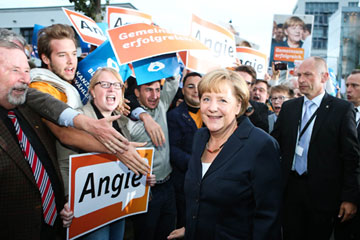
German Chancellor Angela Merkel greets her supporters outside a studio ahead of the TV debate in Berlin, Germany, Sept. 1, 2013.
(4 of 4)
That's because power in Germany is already widely distributed. The country's turbulent history weighs heavy on its political establishment, counseling caution. German leaders shy away from stridency in international affairs and remain wary of military interventions. Merkel's predecessor, the SPD's Gerhard Schröder, spoke out against the U.S.-led invasion of Iraq. In 2011, Merkel argued against the imposition of a no-fly zone in Libya. She has been swift to rule out any military participation in a strike against the Syrian regime too.
German federal structures include onerous checks and balances — a constitutional court with the ability to block intergovernmental deals, a political system that grants substantial powers to state legislatures and reliably deprives parties of overall majorities at the state and national level. In Merkel's first term, she headed a grand coalition of CDU/CSU and SPD, with Steinbrück — her current rival for the Chancellery — serving as her Minister for Finance. In the past four years, she has worked with the economically liberal Free Democrats. The SPD is campaigning for a coalition with the Greens; Merkel aims to continue her current liaison with the Free Democrats. Polls point to another grand coalition, but any final constellation — and its priorities — will almost certainly be decided not just by voters but also in detailed coalition negotiations after the elections.
Putting Trust in Mother
In the final months of the GDR, de Maizière gave Merkel her break in politics, appointing her as his deputy spokeswoman. She shone. "Her briefings were half as long [as her colleagues'] but twice as information-rich," says her former boss. He did ask his office manager to have a quiet word with Merkel on the eve of a diplomatic trip to Russia. "Please tell her to lose the Jesus sandals and buy some clothes better suited to public office," he begged. Merkel turned up to work the next day in a new outfit but blushed when de Maizière complimented her on it.
She's still not entirely comfortable with being looked at. "She would rather work than wave," says her school contemporary Moock. But Merkel's stolidity is now being showcased as an asset in a campaign devised by the Berlin-based agency Blumberry. The campaign emphasizes Merkel's "authenticity, reliability, trustworthiness. Artificiality never works," says Lutz Meyer, Blumberry's managing partner.
The majority of imagery selected for Merkel's Blumberry-designed website and print material has been drawn not from posed shoots but from real-life vignettes. The campaign's must-have collectible is a booklet of photos of the Chancellor, including a few private shots from family albums, garnished with modest biographical details. Voters "rip [the booklets] out of our hands," says a campaign insider.
Here is Merkel with her husband, a distinguished scientist called Joachim Sauer, who is even more publicity-averse than his wife. When Merkel was sworn in as Chancellor, he opted to watch the ceremony on TV. And here's a much younger Angela pushing a doll in a buggy, playing mother, as the childless politician now plays mother to her entire country.
Ordinary citizens feel safer in Mutti's care. The election could be seen as a rite of passage, giving voters a choice between the comforts of the government they know or striking out into the unknown. The SPD's Nahles hopes to convince them that they need to cut loose from the apron strings in order to preserve their comforts. "This government will go into the German history books as the one that has made the fewest laws," she says. "Staying still for a country means, in the end, going backward."
Merkel agrees. In Recklinghausen, she speaks of the need to modernize Germany's economy to meet the trials of globalization. But she also repeats her campaign slogan "erfolgreich zusammen" — successful together. Her message is that Germany is already on the right path. Small steps, not big ideas, are the way forward. "She's so admired because the way she does things is close to the German soul," says the campaign insider. Win or lose, Merkel represents contemporary Germany in all its complexity, a huge country that prefers to behave like a small one.
— with reporting by Jay Newton-Small / Washington
